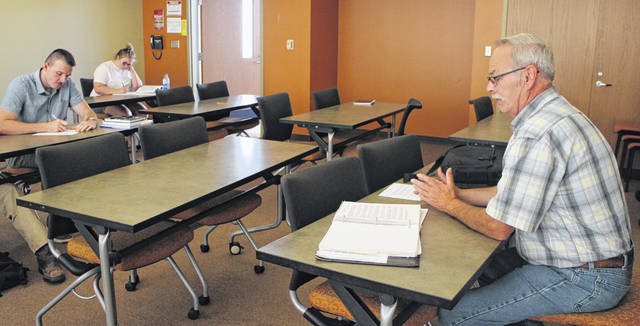
Editor’s note – This article is one of a series of feature stories from Southern State Community College highlighting alumni and the specific degree programs they completed.
Aaron Reynolds was working as a corrections officer at a prison in Lebanon when he decided he wanted to become a police officer, but with a family and a full-time job, enrolling full time at a police academy seemed daunting.
Having settled in the Highland County area, Reynolds looked into classes at Southern State Community College and found the flexibility he needed to complete academy training while working full time.
Reynolds, now a sergeant with the Hillsboro Police Department, eventually went on to complete his associate’s degree in law enforcement in 2009. He said the experience “wasn’t as difficult as I thought it would be.”
Reynolds said with the help of the college’s advising department, he was able to leverage his prior military and law enforcement experience into credit toward his degree, and he took his time finishing it.
“They were very accommodating,” he said. “They weren’t pushy in the classes; they said, ‘These are the classes you need to complete by this time.’”
Reynolds said the biggest challenge in getting an education was balancing his work and family life while attending classes.
“Southern State understands the people who go to school there have other things going on in their life,” he said. “We’re not full-time students. They were very willing to work with me.”
Longtime peace officer and former Greenfield police chief Robin Roche oversees the law enforcement program at Southern State, which includes the state-sanctioned peace officer academy and two-year associate’s degree in law enforcement.
Roche said his students have gone on to dozens of agencies and careers, including probation, parole, investigation, general policework and case management. According to Roche, one student went on to investigate complaints against hearing doctors, and another became an investigator for the state gambling commission.
Roche said coursework for the associate’s degree includes constitutional law, prisoners’ rights, search and seizure, current issues, crime scene investigation and many other topics. Roche added that while the Crime Scene Investigation Module of the police academy is limited, the associate’s degree includes extensive crime scene investigative training, including analyzation of blood spatters and ballistics.
According to Roche, studying current events and trends is essential to law enforcement education – whether that means studying what causes prison overcrowding or radio communication issues on 9/11.
“Previously, officers in a crisis situation were taught to let it die out and do negotiations,” he said. “Now, they’re taught to go in immediately and neutralize the threat.”
Knowledge of these trends and events could mean life or death for future peace officers and civilians, Roche said.
Roche said he finds most students’ biggest challenge is funding, and for those students, Southern State is able to offer financial assistance. There are also many benefits for veterans like Reynolds, Roche said.
Roche said no two students are the same, especially when it comes to practical skills like shooting and driving. Students who have never shot a gun before can be the best learners, he said, “because they don’t have any bad habits.” Students who grew up on a farm are better at backing up a vehicle than students from urban areas – a skill that makes up about 70 percent of the state driving test.
Roche said he enjoys watching his students’ progress and achieve their goals.
“It’s like watching your children get their driver’s license,” he said. “Watching them grow is very rewarding.”
Reynolds said while getting an education in law enforcement is challenging, it is worth it in the end. “It can be difficult at times,” he said, “but don’t be afraid to take a couple classes and try it out. You never lose the education you receive.”
For more information about Southern State’s Law Enforcement Program, please visit www.sscc.edu, email Robin Roche at [email protected], or call 800-628-7722, Ext. 5657.
David Wright is a local journalist and freelance writer.


